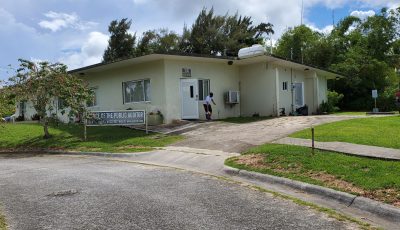Bill seeks to loosen rules for accepting nonmonetary gifts
OPA: Amendments to Ethics Act would injure public confidence
A bill to amend the Ethics Act that would loosen rules for public officials in accepting gifts of value has been amended and sent back to committee to remove limits on nonmonetary contributions, according Rep. Joseph Leepan Guerrero (R-Saipan), the bill’s author.
Original versions of the bill—House Bill 19-84—drew the concern of the Office of the Attorney General and Public Auditor Mike Pai.
In October, Pai questioned whether the wisdom of the 8th Legislature—which set the mandates of the Ethics Act—needed reconsideration. He said tinkering with the Ethics Act would “only injure public confidence in government.”
In an interview on Wednesday, Guerrero said the bill is back in committee to clarify its provisions.
“We just want to clarify the language, the heading of the bill, the intent,” he told Saipan Tribune.
Guerrero said they are not removing the $50 cap—which sets the threshold of value that public officials can accept—except “for elected officials and the governor and judges.”
“It allows them to receive any form of nonmonetary contribution in any denomination, from a penny up to whatever that is in line with our law,” Guerrero said.
“The main reason we turned it back into committee was we wanted to make a clarification on that aspect. We took out the language that removed the clause that does not permit the governor, judges, and elected officials from receiving anything above $50.
“So we kind of just left it open. We must report it, in the event that we receive anything above $50 in our yearly financial statement to OPA. But anything that is in a higher value remains a government property.
“We just want to make sure that we are not infringing or violating any laws entirely, so that is the intent of the bill, to protect the integrity of the judges, the governor, and the lawmakers,” he said.
Bill changes
The Ethics Act states that: “No person shall give or offer to give to any public official, judicial officer, employee, or Commonwealth contractor, or to the spouse or minor child of any of them, and none of them shall accept, anything of value, including but not limited to, a gift, favor or promise of future employment, based upon any explicit or implicit mutual understanding that the votes, official actions, decisions or judgments of any official, employee, or Commonwealth contractor concerning the business of the Commonwealth would be influenced thereby. It shall be presumed that nonmonetary gift having a value of less than $50 does not involve such and understanding.”
Guerrero’s original bill struck out $50 in the last provision and inserted $200. That would essentially allow nonmonetary gifts, provided they aren’t valued more than $200. In the amended version, this clause is removed entirely.
Committee findings
The House Committee on Judiciary and Government Operations had reviewed the bill and recommended its passage.
According to the committee report, many countries have traditions of hosting visitors or being a gracious guest. One social norm commonly practiced by visiting guests or hosts is the offering of nonmonetary gifts. The committee said these gifts “become a social tradition of illustrating appreciation and hospitality.”
“Our public officials have hosted prominent individuals from visiting countries and in turn have also become guests in many countries. On many occasions our public officials are placed in the difficult position of juggling ethical compliance with the social and cultural norms associated with hosting visiting guests or being a gracious guest while off-island.
“Difficult situations in which an innocent well-intended nonmonetary gift—given as a form of appreciation for being a hospitable host or gracious guest as is the social tradition in many countries—is rejected due to the Ethics Code Act of 1992. Specifically the accepting of ‘nonmonetary gift having a value less than $50.”
The lawmakers said the Ethics Act of 1992 was passed to ensure public officials are free from influence and potential conflicts of interests, to develop accountability and preserve public confidence in the government.
“…The proposed amendment does not intend to crumb these principals,” the committee said. “The committee incorporated a number of their concerns, thereby recommending the passage of this legislation.”
AG letter
In his comments on the original version of the bill in late July, assistant attorney general Michael Witry questioned the bill’s intent to account for inflation in raising allowed monetary gifts from $50 to $200.
The bill, in its finding and purpose statement, says “a lot of time has elapsed between [the statute enacted in the 8th Legislature and now] and prices have increased drastically. Therefore, our existing statute must be updated in order to be in line with present economic conditions.”
“This bill is legally sufficient,” Witry said in his July 30 letter. “However, the purpose of the bill states that the increase is to account for the effects of inflation? Inflation has not been quite severe as the bill estimates. According to the Bureau of Labor Statistics’ CPI Inflation Calculator, $50 in 1994 dollars (when this statue was enacted) has the same buying power as $80.51 in 2015 dollars.”
‘Crumbling ethics’
The Office of Public Auditor seconded the AG’s concerns in their comment letter and went further to question the need for the bill.
OPA said they appreciate the “difficult position” public officials face when juggling ethical compliance with the social and cultural norms associated with hosting visiting guests and being a gracious guest while off-island. These situations often present officials with “a choice between rejecting an innocent, well-intended gift and strict compliance with the law,” OPA said.
“Nonetheless, OPA stands behind the purposes cited by the 8th Legislature in enacting the Ethics Code Act of 1992 and suggests change would only injure our government through loss of public confidence,” OPA’s Pai said.
The Ethics Code Act was passed to ensure public officials are free from influence and potential conflicts of interest, to develop accountability and preserve public confidence in our government, the OPA said, citing Commonwealth Code.
“The proposed raising of the nonmonetary gift amount threshold has potential to erode all of these principals,” Pai said.
He further noted that the federal government’s threshold for nonmonetary gifts is $20, as long as the gifts from one person do not exceed $50 in a calendar year.
According to the OPA, single nominal gifts may not seem as though they can cause influence or erode public confidence, but in the aggregate they easily can.
A $200 threshold with no aggregate limit could easily turn into a sum much more than a one-time meal of $150, and that “this loophole is very concerning.”
On the issue of inflation, Pai said that even adjusting the 1992 figures for current dollar amounts would suggest the threshold should be moved to around $85—“far less than the current $200 figure.”
“It is important to stress the purpose of a low threshold is primarily to safeguard against the appearance of impropriety rather than preventing actual influence peddling,” Pai said. “Even innocent nominal gifts from regulated parties to their regulations carry risk of the appearance of impropriety. These dangers are only compounded when the limits are raised, especially if there is no aggregate limit or reporting requirements.”
If the Legislature wishes to raise the existing threshold, OPA encourages a limit no higher than $85, an aggregate threshold of no more than $200 from any given entity, and a requirement that all such gifts be reported to OPA, including penalty for failure to report.
Local perspective
“I think Mike is looking at it from the costs of goods in the mainland,” said Guerrero, when asked to comment on Pai’s concerns. “They are not looking at it from here, from this perspective. I mean you can’t take national and apply it here on principle because in the national level, everything there is cheap.”
“We are a thousands miles of away from the mainland and the costs of goods is not cheap. You have dignitaries and investors coming in and part of the gesture is they present gifts to the lawmakers and the judges and the governor itself and the lieutenant governor. So it’s rude for us to not accept the gifts that are being offered because of the culture itself,” he added.



























